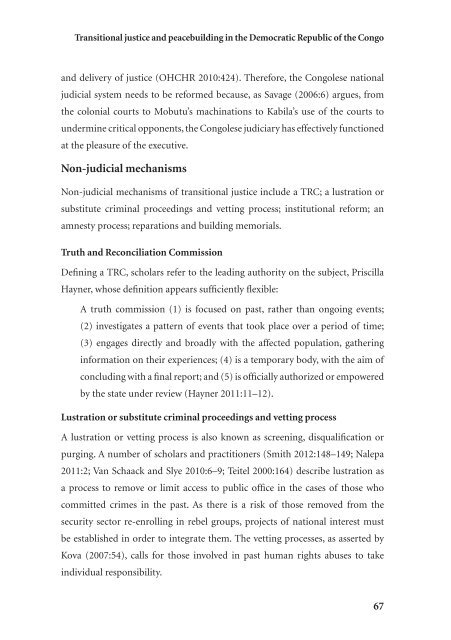ACCORD-ajcr-2015-1
ACCORD-ajcr-2015-1
ACCORD-ajcr-2015-1
- No tags were found...
You also want an ePaper? Increase the reach of your titles
YUMPU automatically turns print PDFs into web optimized ePapers that Google loves.
Transitional justice and peacebuilding in the Democratic Republic of the Congo<br />
and delivery of justice (OHCHR 2010:424). Therefore, the Congolese national<br />
judicial system needs to be reformed because, as Savage (2006:6) argues, from<br />
the colonial courts to Mobutu’s machinations to Kabila’s use of the courts to<br />
undermine critical opponents, the Congolese judiciary has effectively functioned<br />
at the pleasure of the executive.<br />
Non-judicial mechanisms<br />
Non-judicial mechanisms of transitional justice include a TRC; a lustration or<br />
substitute criminal proceedings and vetting process; institutional reform; an<br />
amnesty process; reparations and building memorials.<br />
Truth and Reconciliation Commission<br />
Defining a TRC, scholars refer to the leading authority on the subject, Priscilla<br />
Hayner, whose definition appears sufficiently flexible:<br />
A truth commission (1) is focused on past, rather than ongoing events;<br />
(2) investigates a pattern of events that took place over a period of time;<br />
(3) engages directly and broadly with the affected population, gathering<br />
information on their experiences; (4) is a temporary body, with the aim of<br />
concluding with a final report; and (5) is officially authorized or empowered<br />
by the state under review (Hayner 2011:11–12).<br />
Lustration or substitute criminal proceedings and vetting process<br />
A lustration or vetting process is also known as screening, disqualification or<br />
purging. A number of scholars and practitioners (Smith 2012:148–149; Nalepa<br />
2011:2; Van Schaack and Slye 2010:6–9; Teitel 2000:164) describe lustration as<br />
a process to remove or limit access to public office in the cases of those who<br />
committed crimes in the past. As there is a risk of those removed from the<br />
security sector re-enrolling in rebel groups, projects of national interest must<br />
be established in order to integrate them. The vetting processes, as asserted by<br />
Kova (2007:54), calls for those involved in past human rights abuses to take<br />
individual responsibility.<br />
67


